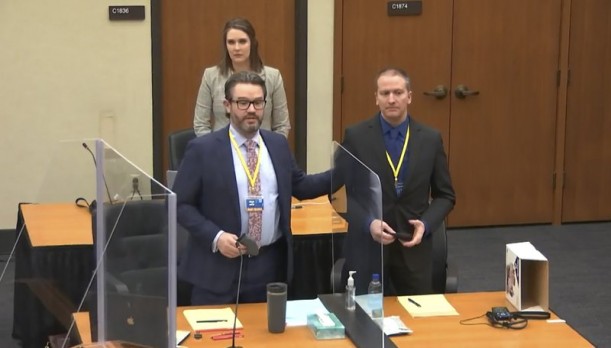Jurors in High-Profile Murder Trial Face Heavy Burden

Defense attorney Eric Nelson, left, defendant Derek Chauvin, right, and Nelson’s assistant Amy Voss, back, introduce themselves to potential jurors on Tuesday, March 23, 2021, at the Hennepin County Courthouse in Minneapolis. (Court TV/Pool via AP)
One prospective juror’s voice quivered as she told attorneys during jury selection that she feared for her family’s safety if chosen for the panel that will decide the fate of a white former police officer charged with killing George Floyd. When the judge excused her, the woman exhaled in relief.
Jurors at all trials feel pressure, knowing their decisions will alter lives. But the weight on jurors in Minneapolis is in a whole different category as they’ll be asked whether to assign guilt in the death of a Black man that prompted some of the largest protests in U.S. history.
Bystander video shows Derek Chauvin using his knee to pin Floyd’s neck to the ground for about nine minutes during an arrest last May.
Floyd cried he couldn’t breathe and called for his mother before his body went limp.
A looming question is whether Chauvin, charged with murder and manslaughter, can get a fair trial with so much pressure on jurors and with some potentially fearing the consequences to the city and country should they reach a verdict that others oppose.
A high fence installed around the courthouse for the trial is a daily reminder for jurors of security concerns. On some days, protesters gathered just beyond it, holding signs that read, “Convict Derek Chauvin” and “The World Is Watching.”
Jurors are well aware that Floyd’s death led to months of protests in Minneapolis and cities nationwide. They’re aware, too, that thieves took advantage of demonstrations to break into, ransack and sometimes burn down stores. A judge denied a request to change the trial’s venue, a ruling Chauvin could cite on appeal if convicted. Appeals with change-of-venue disputes at their core are rare but not unprecedented.
A U.S. appeals court in 1999 vacated white Detroit police officer Larry Nevers’ conviction in the beating death of a Black motorist, even though evidence against him seemed strong. The court noted how at least one juror heard that the National Guard was on standby in case Nevers was acquitted and violence ensued.
“The Court cannot imagine a more prejudicial extraneous influence than that of a juror discovering that the City he or she resides in is bracing for a riot,” it said. It added that letting the conviction stand would send the wrong message that rights to an impartial jury “do not extend to an obviously guilty defendant.”
At the 1991 trial in Miami, jurors found Hispanic police officer William Lozano guilty of manslaughter. The appellate ruling months later that overturned the conviction highlighted how some jurors admitted they feared an acquittal would renew protests. At his 1993 retrial in Orlando, more than 200 miles from Miami, Lozano was acquitted.
Numerous people expressed unease about serving on the panel for Chauvin’s trial during the more than two weeks of jury selection. At least one who became teary-eyed was excused, as were others who were visibly unnerved. Others displayed no such apprehension.
A Black man in his 30s who was ultimately put on the jury wrote on a questionnaire that the Chauvin trial was the biggest case of his lifetime. And he added: “I would love to be a part of it.”
All the Chauvin jurors were asked before being impaneled if they could set aside outside influences and decide the case only on evidence presented at trial. They all assured the court that they could.
Alan Tuerkheimer, a Chicago-based jury consultant, said he believed the Chauvin jurors would become increasingly calm as the trial proceeds and would be able to block out the hubbub.
“The norm is jurors taking these things very seriously,” he said.
User login
Omaha Daily Record
The Daily Record
222 South 72nd Street, Suite 302
Omaha, Nebraska
68114
United States
Tele (402) 345-1303
Fax (402) 345-2351




